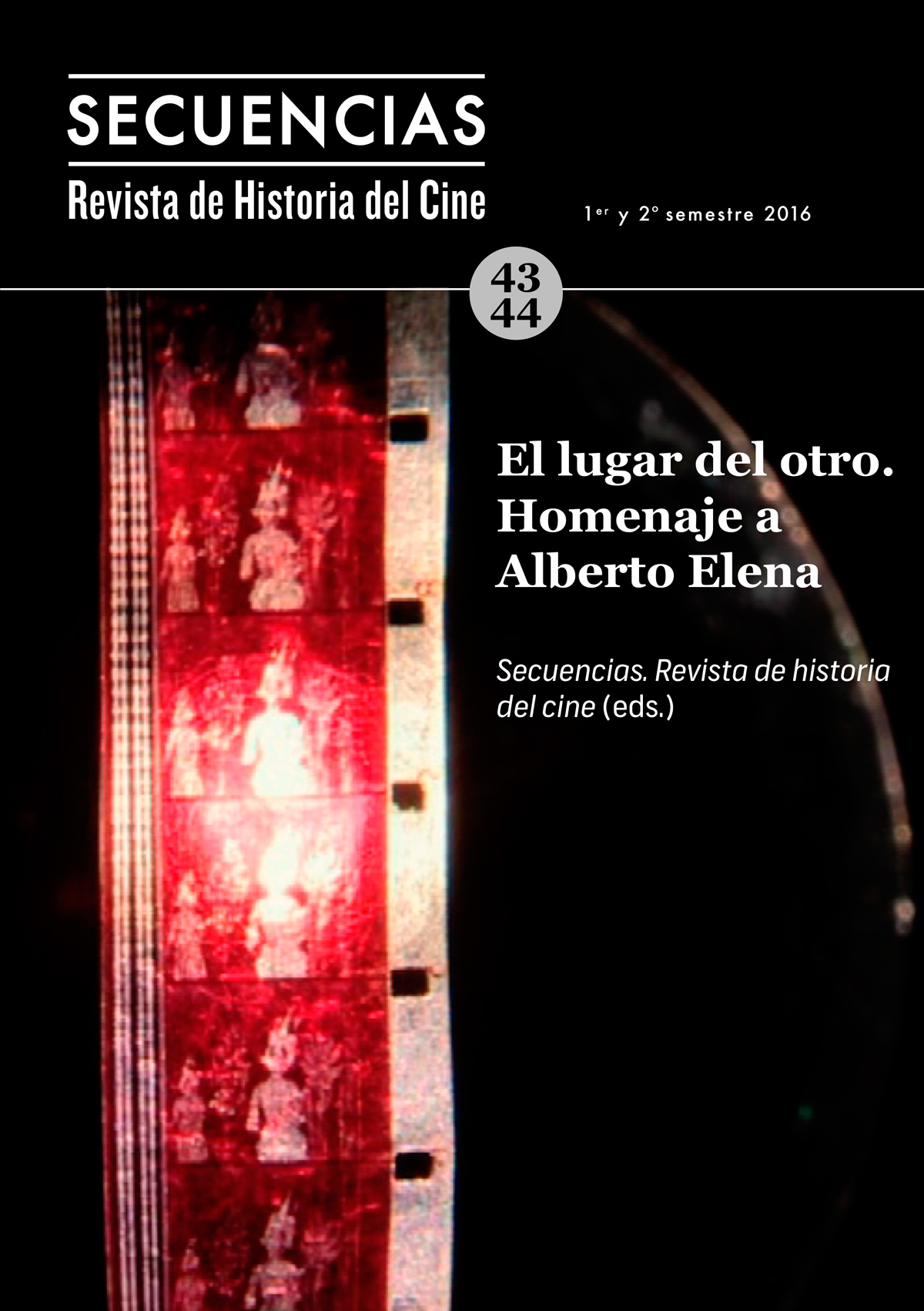Cine militante:Del internacionalismo a la política sensible neoliberal / Militant Cinema: From Internationalism to Neoliberal Sensible Politics
Resumen
En los años sesenta, el cine militante buscó compartir y expandir estrategias y herramientas para la lucha política alrededor del mundo. Ici et ailleurs (1969- 1974), la película que Godard filmó con Jean-Pierre Gorin bajo el marco del Grupo Dziga Vertov y editó con Anne-Marie Miéville, no es solo un ejemplo de cine político de vanguardia, sino un recuento auto-reflexivo del resultado de las revoluciones aquí y en otro lado, del devenir de la militancia y el cine comprometido y de su repudio a mediados de los años setenta. En este ensayo, me enfoco en tres elementos que forman parte del legado del cine militante en general, y específicamente de Ici et ailleurs: primero, las lecciones que se pueden derivar de las ordalías derivadas de simpatizar, hablar o imaginar procesos políticos de otros, en otros lados. Segundo, el problema que Godard plantea en películas posteriores a Ici et ailleurs, a lo que llamo la «mediatización de la mediación», como la forma de activismo que siguió al rechazo del marxismo-leninismo como depositario de la política progresiva. Tercero, la no poco problemática transformación de la política de la imagen de Godard en la «política sensible» post-política, un nicho en la producción cultural que se ha dado la tarea de codificar actos políticos inestables en formas mediáticas, transformando la acción y enunciación política en cuestión de expresión.
Palabras clave: cine militante, Jean-Luc Godard, Palestina, activismo, política sensible, post-política, compromiso político.
Abstract:
In the 1960s, militant cinema aimed to share and expand strategies and tools for the political struggle around the world. Ici et ailleurs (1969-1974), the film that Godard shot with Jean-Pierre Gorin within the Dziga Vertov’s Group and edited with Anne-Marie Miéville, it is not only an example of avant-garde political cinema, but also an auto-reflexive account of the outcome of revolutions here and elsewhere, of the development of militancy and committed cinema and of its rejection in the mid of the 1970s. In this essay, I will focus on three elements that form part of the legacy of militant cinema in general and specifically of Ici et ailleurs. Firstly, the lessons that can be derived from the ordeals that come out from sympathizing, talking, and imagining political processes of others, in other places. Secondly, the problem that Godard suggested in films that came after Ici et ailleurs, which I call ‘mediatization of mediation’, such as the form of activism that followed the rejection of Marxism-Leninism as the repository of the progressive politics. Thirdly, the not less problematic transformation of Godard’s politics of the image to the post-politics’ ‘sensitive politics’, a niche in the cultural production that embarked on the role of encoding unstable political acts in media forms, transforming in terms of expression the political action and enunciation.
Keywords: Militant cinema, Jean-Luc Godard, Palestine, activism, sensitive politics, post-politics, political commitment.
Descargas
Citas
Adachi, Masao, «The Testament that Godard has never Written», (2002) en Nicole Brenez y Go Hirasawa (eds.), Le Bus de la revolution passera bientôt pres de chez toi (Editions Rouge Profond, 2012)
Barthes, Roland, Le Degré zéro de l’écriture (Paris, Seuil, 1953)
Baudrillard, Jean, «Requiemforthe Media» en For a Critique of the Political Economy of the Sign(St.Louis Mo, Telos,1981).
Berardi, Franco (aliasBifo), La fábrica de la infelicidad. Nuevas formas de trabajo y movimiento global (Madrid, Traficantes de Sueños, 2003)
Deleuze, Gilles, «La gauche a besoin d’intercesseurs» en Pourparlers (Paris,Les Éditions de Minuit, 1990)
Derrida, Jacques, Ecographies of Television: Filmed Interviews (Cambridge, Polity,2002)
Dreyer, Sylvain, «Autour de 1968, en France et ailleurs: Le Fond de l’air était rouge» (Image & Narrative, Vol. 11, nº 1, 2010) <http://www.imageandnarrative.be/index.php/imagenarrative/article/view/54/35> (07/12/2016)
Emmelhainz, Irmgard, «Between Objective Engagement and Objective Cinema: Jean-Luc Godard’s “militant filmmaking” (1967-1974)», (e-flux journal, nº 34, April 2012; e-flux journal, nº35, May 2012)
Emmelhainz, Irmgard, «From Thirdworldism to Empire: Jean-Luc Godard and the Palestine Question» (Third Text, Vol. 23, nº5, 2009), pp. 659-656.
Emmelhainz, Irmgard, «Trademark Images and Perception:Godard, Deleuze and Montage», Nierika, Revista de estudios de arte, (Vol. 5, Mayo 2014), pp. 30-44
Foucault, Michel,El gobierno de sí y de los otros, curso del Collègede France (1982-1983) (Madrid, Akal, 2011)
Godard, Jean-Luc «Manifeste» en David Faroult (ed.),Jean-Luc Godard Documents(Paris, Centre Georges Pompidou, 2006),pp. 138-140.
Godard, Jean-Luc, «Moi, je» » en David Faroult (ed.),Jean-Luc Godard Documents(Paris, Centre Georges Pompidou, 2006)
Godard, Jean-Luc, «Wha tis to be done?» (Afterimage, nº1, Avril 1970).
Kant, Immanuel, «The Contest of th Faculties» en Kant: Political Writings(Cambridge: The University Press,1991),
Kraus, Chris;Lotringer, Sylvère, «Introduction: The History of Semiotext(e)», en Hatred of Capitalism (Los Angeles: Semiotext(e), 2001), p. 10. <http://rebels-library.org/files/hatred.pdf> (07/12/2016)
Ladha, Alnoor, « Kenya: Artivists Versus the State » (Aljazeera, April16, 2014) <http://www.aljazeera.com/indepth/opinion/2014/04/kenya-artivists-versus-state-2014415144147632633.html> (07/12/2016)
Lovink, Geert, «Hermes on the Hudson: Notes on Media Theory after Snowden» (e-fluxJournal, nº 54, April 2014) <http://www.e-flux.com/journal/hermes-on-the-hudson-notes-on-media-theory-after-snowden/> (07/12/2016)
McLagan, Megan ; McKee, Yates«Introduction», Sensible Politics: The Visual Culture of Nongovernmental Activism, (Cambridge, Mass., Zone Books, 2012)
Ross, Kristin, May’68 and its Afterlives (Chicago, The University Press,2002),
Sanbar, Elias, «Vingt et un ans après» (Traffic, nº 1, 1991),
Schefer, Raquel, «Une forme présente en tension filmique. Représentation cinématographiques des mouvements politiques contemporains» (La furia umana, nº19, March 2014)<http://www.lafuriaumana.it/index.php/47-lfu-19/154-raquel-schefer-une-forme-presente-en-tension-filmique-representation-cinematographiques-des-mouvements-politiques-contemporains> (07/12/2016)
Steyerl, Hito, «Is a Museum a Factory?»(e-flux Journal, nº 7, June 2009) <http://www.e-flux.com/journal/is-a-museum-a-factory/> (07/12/2016)

